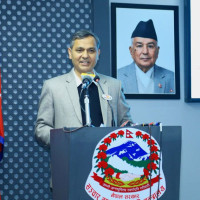- Thursday, 26 February 2026
Yomari Punhi being marked today
Kathmandu, Dec. 15: Yomari Punhi, a notable festival celebrated by the Newar community in Kathmandu, marks the end of the harvest season with offerings to Annapurna, the goddess of grains. This year, the festival is being observed on Sunday, Mangsir Shukla Purmina (full moon day of December).
In Newari language ‘Yomari’ means favourite confection. On the occasion, the Newar community prepare a special delicacy called yomari, a closed cone-shaped cuisine made of rice flour, filled with molasses (chaku), khuwa and sesame seeds.
Binita Shrestha, a local from Ason, says that Yomari Punhi is not only about food but also about storytelling and heritage. She said, “Families gather to prepare the feast and make yomari. Later in the evening, people go for tyo-si-tyo (an activity where children and adults go door-to-door, singing traditional songs asking for yomaris and other treats from households). This is a communal festival.”
According to her, tyo-si-tyo carries traditional and cultural values. She said, “Newar people value sharing food and celebrating festivals with family and friends. Historically, yomari was a rare food prepared once a year. Thus, people used to play tyo-si-tyo and share yomari in the community.”
Sarika Singh from Dallu shares her own celebration of the festival, which begins with cleaning her house and performing the puja. She then prepares the feast, which includes Newari cuisines and yomari. She said, “Yomari is a special delicacy. One needs skills to prepare such food. Firstly, dough is made from freshly grounded rice flour using hot water. We shape the dough into yomaris and fill them with a mixture of sesame seeds, molasses and khuwa.”
The feast is later offered to ancestors and the paddy bhakari, a traditional container for storing food grains. This offering is accompanied by prayers for the harvested grain to be sufficient for the family round the year, she added.
Meanwhile, the unique cone-shaped yomari also offers several health benefits due to its ingredients and preparation method. Made from rice flour, it is gluten-free and easily digestible, providing a quick source of energy through its carbohydrate-rich dough. The filling, often a mix of sesame seeds and molasses, adds significant nutritional value. Traditionally enjoyed in winter, it’s warm and nutrient-dense ingredients help keep the body warm and energised during cold weather.
Additionally, the festival comes alive with cultural enthusiasm as people gather in Basantapur, dressed in their traditional attire, women in ‘hakupasati’ and men in ‘tapa lan’. On this day, Basantapur transforms into cultural hub as people participate in rallies organised by different guthis and organisations.













-original-thumb.jpg)


